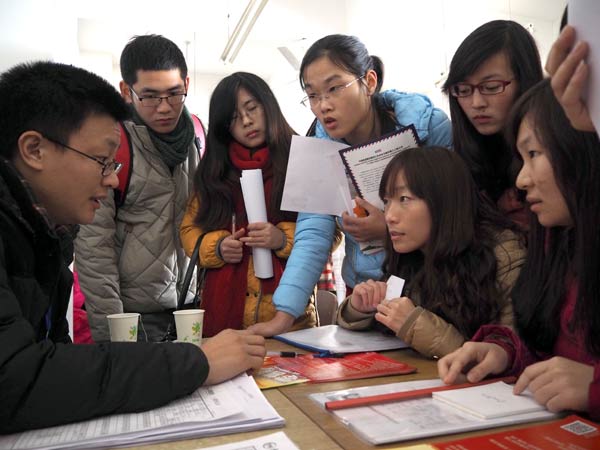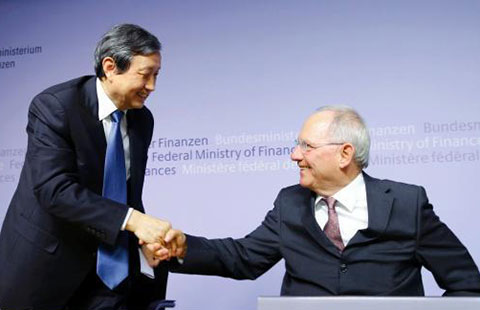Student entrepreneurs learn harsh lessons in China
By Su Zhou (China Daily) Updated: 2015-03-05 08:25
 |
|
Graduates discuss career prospects with a company representative at a job fair in Huai'an, Jiangsu province, on Dec 6. HE JINGHUA AND ZHANG CHI/FOR CHINA DAILY |
Fresh from schoolroom
In July, Yuan will be among a record 7.49 million graduates from China's universities and colleges. The ever-rising number of graduates is rapidly becoming a challenge; last year, the figure was 7.27 million, and in 2013 it was 6.99 million.
According to a recent report by Northeast Normal University, the net employment rate for graduates last year was 88.82 percent and the average monthly salary was 3,412 yuan ($544). However, only 67.83 of graduates believed their work required any expertise, and just 68.21 percent were satisfied with their employment prospects.
Chen Yu, vice-president of the China Association for Employment Promotion, said new pressures are affecting the employment market: "First, technology, especially Internet technology such as cloud computing and big data, is reshaping China's industrial structure. The change will affect the requirements for many jobs, and also affect job seekers at all levels. Second, the fall in global production costs and rising human costs in China have seen many job opportunities flow to other countries."
Zhang Fengyou, director of the China Higher Education Student Information and Career Center at the Ministry of Education, said that in general terms the employment outlook for new graduates is pessimistic, especially as the Chinese economy has entered the "new normal" of slower growth.
The issue has already been the subject of much debate at the "two sessions", the annual meetings of the country's top advisory and legislative bodies that will run for the next two weeks.
"To help implement the strategy of prioritizing educational development and the development strategy to promote employment, the Standing Committee held a consultative meeting on speeding up the establishment of a modern vocational education system," said Yu Zhengsheng, chairman of the National Committee of the Chinese People's Political Consultative Conference, on Wednesday. "We held forums on how to provide graduates with a better employment environment and how to help them start businesses."
Despite what they perceive as a poor outlook, Chen said graduates should not lose hope, because they have a huge number of advantages. "Compared with other job seekers, such as migrant workers, they can do more and they can do better. Let's take selling buns as a good example-university graduates could develop a sideline into a full company," he said, adding that encouraging young people to start their own businesses is a good idea because innovation is a key driver of national development.
Since taking office in 2012, Premier Li Keqiang has encouraged young people to start businesses. In July, he visited the startup center at Hunan University, and spent 106 yuan on postcards and a box of pencils made by student startups.
Li's support has been reinforced by a number of official statements, including one released after he presided over an executive meeting of the State Council that read: "China should embrace the trend of mass entrepreneurship and innovation in the Internet age."
- Israel requests to join Asian Infrastructure Investment Bank
- Chinese stocks rebound on April 1
- China, the West in Africa: more room for cooperation than competition
- Nanjing cuts taxi franchise fees
- Air China increases flights to Milan, Paris
- JD.com raises delivery charges
- Veteran corporate strategist upbeat about China economy
- L'Oreal China sales revenue up 7.7% in 2014

















